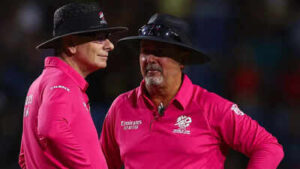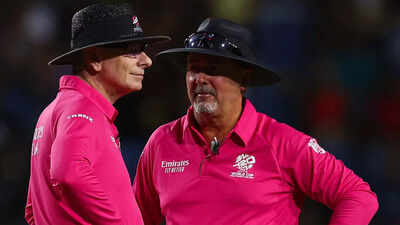
In a recent development, the International Cricket Council (ICC) announced a plethora of significant changes in the playing conditions that will affect Tests, ODIs and T20Is. Some of the rules are already in effect and the rest will be introduced in July 2025. The new rules cover everything from the pace of the match to the use of equipment, to even concussion protocols and fielding regulations. The new changes will make a substantial impact in an already rapidly evolving game.
One change that will most have the biggest impact on the game will be the introduction of the stop clock in Test Cricket, which will aim to speed up the game. The bowling team will now only have 60 seconds to spare in between two overs, meaning, they will only have a minute’s time to deliver the first ball of a new over. Umpires will give out two warnings before a five-run penalty. The clock will restart after every 80 overs in line with the availability of the new ball.
In the 50-over format, the rule regarding new balls has now seen a change, and the rule has reverted to a hybrid model. Two new balls will be used for the first 34 overs, and then the fielding side can select one of the two to use for bowling for the final 16 overs. This new rule was changed to address the impact of reduced ball wear on spin and reverse swing in the latter stages of the match.
While the discourse about new balls continues, boundary catches have also received a major update. A fielder now must be airborne when in contact with the ball beyond the boundary and must land and stay inside the field to complete a legal catch. This change has now ensured clarity and fairness after bunny-hop catches sparked debate in the cricketing fraternity. The rule will be first implemented in international cricket and then written into the MCC Laws.
One other notable change is that the DRS will now include a redefinition of the ‘wicket zone’ which will mimic the exact outline of the stumps and the bails.
Concussion protocols have now been enhanced following another debate that raged after Harshit Rana was subbed in for Shivam Dube in an India vs England game where India went on to win the game after Rana’s 3-34, a match-winning performance. Concussed players will also have a mandatory seven-day stand-down period and the subs should be pre-nominated to reduce home-team advantage. Deliberate short runs will now warrant a five-run penalty and will allow the fielding captain to choose which batter faces the next ball.
The changes have been spearheaded by ICC Men’s Cricket Committee chaired by Sourav Ganguly and have reflected a growing emphasis on player safety, pace of play and a more even contest between bat and ball.
All updates will be enforced across international matches starting with the Sri Lanka vs Bangladesh series in June and July 2025.




